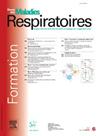A postbiotic supplementation in early life impacted Respiratory Syncytial Virus infection in mice
IF 0.5
4区 医学
Q4 RESPIRATORY SYSTEM
引用次数: 0
Abstract
Introduction
The Respiratory Syncytial Virus (RSV) causes severe bronchiolitis in children with 30% of them affected each year. Infection in neonates is characterised by a Th2 immune response and a low Th1 increasing the risk to develop asthma later. Oral probiotics supplementation reduced RSV infection by modulating the lung immune response [1]. However, no study describes nor the effect of postbiotics or inanimate bacteria in very early life.
Methods
Five-days-old BALBC mice were randomly divided into two groups, one receiving tyndallized Bifidobacterium breve LA708 (equivalent to 5 × 108 CFU before tyndallization) or the other PBS as negative control every day during 2 weeks. Luciferase recombinant RSV (205 × 103 pfu per animal) was intranasally inoculated at day 21 to half the mice in both groups. Infection was recorded in vivo by bioluminescence in lung and snout at 1.4 and 10 days post infection (dpi). Animals were necropsied and tissues and bronchoalveolar fluid (BALF) were collected for analysis of viral replication (bioluminescence activity) and lung inflammation (luminex assay and cytometry).
Results
All infected animals showed a mean radiance of around 1 × 104 in lungs and 1 × 105 in snouts at 1 and 4 dpi confirming the infection. B. breve LA708 showed no effect on infection at 1dpi in either the snouts or lungs. However, animals supplemented with B. breve LA708 exhibited lower infection in snouts at 4 dpi compared with animals supplemented with PBS. Similarly, although all mice were free of infection at 10 dpi in the LA708 group, a few mice still exhibited lung infection in the PBS one. An analysis of the immune response was then performed to decipher the effect of the strain. At 1 dpi, infected animals supplemented with B. breve LA708 showed a higher but non-significant number of polynuclear neutrophils and lymphocytes in BALF compared with infected control mice (P = 0.13) without affecting the total number of cells. Similarly, it seemed that IFN-b, TNF-a and IL-6 were increased in the lungs of animals supplemented with B. breve LA708 compared with infected control mice at 4 dpi. At 4 and 10 dpi, lungs of infected neonates supplemented with B. breve LA708 expressed an increased level of CD45 + leucocytes compared to those supplemented with PBS with an enhance on the proportion of CD8 + lymphocytes, NK cells and type 1 innate lymphoid cells (ILC1) among lymphocytes.
Conclusion
These data indicated that early supplementations with the postbiotic B. breve LA708 reduced infection in neonates, probably through a faster recruitment of innate immune cells and an activation of Th1 response in the lungs.
早期生命补充后对小鼠呼吸道合胞病毒感染有影响
呼吸道合胞病毒(RSV)在儿童中引起严重的毛细支气管炎,每年有30%的儿童受到感染。新生儿感染的特点是Th2免疫反应和低Th1增加了以后发生哮喘的风险。口服益生菌补充剂通过调节肺部免疫反应来减少RSV感染。然而,没有研究描述过生命早期的益生菌或无生命细菌的影响。方法将5日龄BALBC小鼠随机分为2组,1组在2周内,每天接种短双歧杆菌LA708(接种前相当于5 × 108 CFU),另1组接种PBS作为阴性对照。在第21天,两组半数小鼠鼻内接种荧光素酶重组RSV(每只动物205 × 103 pfu)。在感染后1.4天和10天,通过肺和鼻子的生物发光记录体内感染情况。动物尸体解剖,收集组织和支气管肺泡液(BALF),分析病毒复制(生物发光活性)和肺部炎症(luminex测定和细胞术)。结果所有感染动物在1 dpi和4 dpi时,肺部和鼻部的平均辐亮度分别约为1 × 104和1 × 105,证实感染。短芽孢杆菌LA708对1dpi时鼻部和肺部的感染均无影响。然而,与补充PBS的动物相比,补充短芽胞杆菌LA708的动物在4 dpi时的鼻部感染率较低。同样,虽然在LA708组中所有小鼠在10 dpi时都没有感染,但在PBS组中仍有少数小鼠出现肺部感染。然后对免疫反应进行分析,以破译该菌株的影响。在1 dpi时,与感染的对照组小鼠相比,添加短芽胞杆菌LA708的感染动物BALF中多核中性粒细胞和淋巴细胞数量更高但不显著(P = 0.13),但细胞总数未受影响。同样,在4 dpi时,与感染对照小鼠相比,补充短芽孢杆菌LA708的动物肺部的IFN-b、TNF-a和IL-6似乎有所增加。在4和10 dpi时,与补充PBS的新生儿相比,补充短芽孢杆菌LA708的感染新生儿肺部CD45 +白细胞表达水平增加,淋巴细胞中CD8 +淋巴细胞、NK细胞和1型先天淋巴细胞(ILC1)的比例增加。结论这些数据表明,早期补充后生短芽胞杆菌LA708可降低新生儿感染,可能是通过更快地募集先天免疫细胞和激活肺部Th1反应。
本文章由计算机程序翻译,如有差异,请以英文原文为准。
求助全文
约1分钟内获得全文
求助全文
来源期刊

Revue des maladies respiratoires
医学-呼吸系统
CiteScore
1.10
自引率
16.70%
发文量
168
审稿时长
4-8 weeks
期刊介绍:
La Revue des Maladies Respiratoires est l''organe officiel d''expression scientifique de la Société de Pneumologie de Langue Française (SPLF). Il s''agit d''un média professionnel francophone, à vocation internationale et accessible ici.
La Revue des Maladies Respiratoires est un outil de formation professionnelle post-universitaire pour l''ensemble de la communauté pneumologique francophone. Elle publie sur son site différentes variétés d''articles scientifiques concernant la Pneumologie :
- Editoriaux,
- Articles originaux,
- Revues générales,
- Articles de synthèses,
- Recommandations d''experts et textes de consensus,
- Séries thématiques,
- Cas cliniques,
- Articles « images et diagnostics »,
- Fiches techniques,
- Lettres à la rédaction.
 求助内容:
求助内容: 应助结果提醒方式:
应助结果提醒方式:


